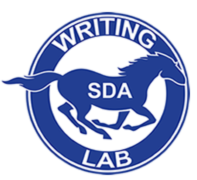There is something I’ve noticed with some student writing over the past couple of weeks that I wanted to address in this week’s post.
Not everyone approaches writing in the same way. Some like to plan and outline days in advance and write with as much precision as possible. Others like to let it flow and bang out an essay in just a few hours. Whatever your method or approach to the written word, there should be one process that is universally the same for all writers: revision.
The problem with the free-flowing method I just described is that while it can be beneficial for some young writers to get the ideas out of their head and onto paper before they vanish, the final product is far from what one could call “complete”. It may be a full five-paragraph essay, but that writing is often made up strictly of “thoughts”, by which I mean compelling but incomplete fragments that often lack flow or connection to the deeper message of our writing, or “thesis” if we are looking at things from an academic point of view. These “thoughts” as they exist don’t serve to prove their point and therefore lead to longer writing, but ultimately weaker writing as a result.
This is where the revision process becomes extremely important. I have tried to teach students never to undervalue revision. Every part of the process, from restructuring arguments and ideas to proofreading for grammar and fluidity are all important in turning your jumble of “thoughts” into actual “sentences” and “arguments”, thereby improving your writing as a whole.
Fortunately, most of us are editors at heart. This is why the crippling “writer’s block” exists: our left-brained tendencies toward logic and sense end up blocking us from reaching for the creativity and elevated thought associated with the right side of our brain. This is what makes it sometimes difficult to get our ideas down on paper. This is exactly why the “excessive planner” I described above over-prepares to write their essay; they are terrified they won’t have anything to say, or worse, won’t know the right way to say it.
The truth is simple: there is no right way of saying anything. The beauty of writing is how subjective it can be. As long as we are able to support it well, we can argue anything we wish, and people can either agree or disagree with our claims if they wish. At the same time, subjectivity is also the cause of much of the agony associated with writing. The uncertainty of “no right way” makes some people wary of the whole art of writing, which is why so many people claim they are not “good writers”.
If it’s the case that there is no right way of saying anything, then it is equally true that there is no such thing as a “good writer” or a “bad writer”. In the end, we are all just writers. But the goal of creating effective writing is to treat revision as a totally objective art form. In order to do this, you, the writer, need to be aware of when you are using thoughts to convey your ideas vs. sentences.
The difference between the two is objective. As I said before, thoughts in their nature will be interesting, but incomplete and unrealized. Sentences on the other hand are, as they suggest, complete thoughts that all have some connection to your overarching purpose, thesis, or argument. The job of a good editor is to realize whether or not what you are writing is necessary and effective. If the sentence you have written is neither necessary or effective towards answering any questions, get rid of it. When you only have so many pages to work with, every word should count towards your final goal.
By the time you have finished strengthening what works and omitting the things that don’t, the final step is proofreading. I highly encourage writers to read their work our loud, because if it makes sense when you’re saying it, it will make sense on the page. This will also help you recognize if you are repeating any phrases or need to vary your word choice to improve the flow of your writing. There are so many benefits to this practice, be they grammatical or organizational.
As a writer myself, these are the things that I find helpful when it comes to revision of my own work. In the end, not only do I have a better piece of writing, but I also feel like I have more ownership over my writing than I did before. If you follow these methods, I guarantee you’ll feel this way too, and you’ll have a good grade to match it!
Now, if you’ll excuse me now, time to edit this post before I publish. Hope I didn’t miss any pronouns or articles in here somewhere.
